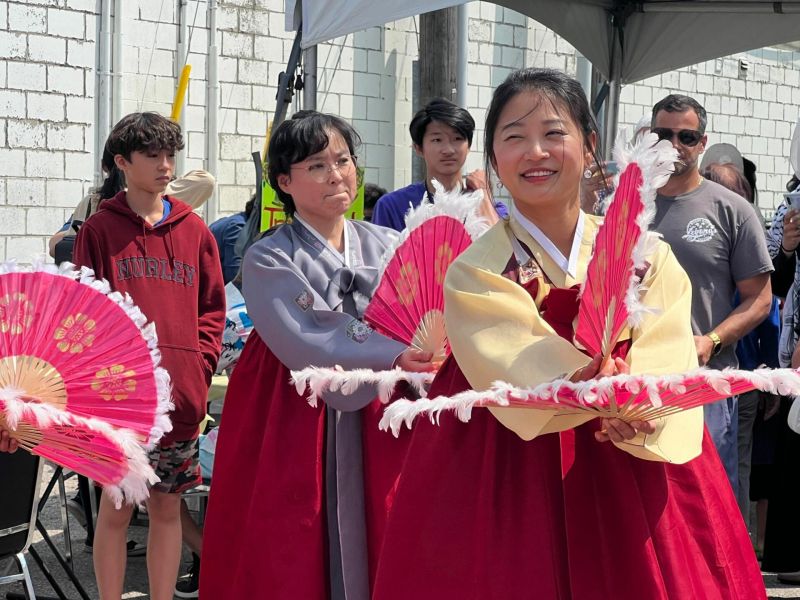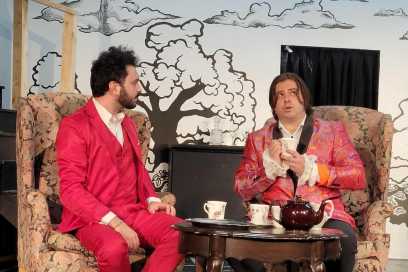Local Theatre Company Switches Things Up In Latest Production
Monday February 13th, 2023, 9:00am
Hello time traveller!!
This article is 937 days old.
The information listed below is likely outdated and has been preserved for archival purposes.
For the first time in its history, a local theatre company is switching roles during its latest play.
Currently staged at the Shadowbox Theatre (located at 103b – 1501 Howard Avenue,) Post Productions’ version of The Children by Lucy Kirkwood is setting itself apart. Unlike other shows from the company, the new performance has alternate interpretations. This means audiences will get two separate takes of the story with different actors depending on when they go.
With Mary Grace Weir pre-cast as Rose, the plan came from having to make a hard decision.
“An exciting aspect of The Children for us is that it contains three first-rate roles for actors in their late 50s to early 70s, which isn’t the case with most of the plays we produce,” said Post’s managing director and producer, Michael K. Potter. “So when the top two contenders for the roles of Hazel and Robin presented us with very different interpretations of both the characters and the story, we faced a dilemma we hadn’t really had to face before.”
This meant narrowing two sets of actors with unique interpretations down to one duo.
Winner of the UK Writer’s Guild Award for Best Play, The Children is about retired nuclear scientists Hazel (Linda Collard, Cheri Scratch) and Robin (Mitch Snaden, Joey Ouellette.) Following a tsunami, the two now live outside an exclusion zone near a nuclear plant’s uncontrolled meltdown. Having made their peace and attempting to move on with life, both are soon confronted by former colleague Rose. Her arrival and frightening request force them to confront moral and existential issues while presenting uncomfortable questions.
ThinkingWeir (starring in Three Tall Women at the time) was a good fit; they showed the actor the script. After expressing her interest, she was cast as the play’s lead. Reading with actors to gauge chemistry for the other two roles, Weir also helped make audition choices: When it came down to final interpretations, she suggested producing both.
Despite providing a solution, though, Potter and Lynn were initially apprehensive.
“We were intrigued but ambivalent,” said Potter. “Yes, this could be an exciting experiment if things worked out, and we ended up with two interesting and legitimately distinct versions of The Children, but it might not work out that way. In either case, the plan presented us with logistical challenges that we might not want to deal with anyway.”
Facing more uncertainty, the play’s venue was also in limbo. With Shadowbox Theatre’s lease expiring in January, the company didn’t know if they’d produce something after The Children. Because of this, however, Potter and director Fay Lynn were ultimately convinced to take a chance.
Even so, challenges still arose. Both were left reassuring actors their work wouldn’t be wasted as auditions began. This meant a commitment to everyone; even if a new venue or dates were required.
In addition, having two Robins and Hazels cut rehearsal time in half for both groups. Meanwhile, Weir was on hand throughout the entire process. This put more pressure on actors to develop their roles independently. Closer to Christmas, specific days were then assigned to each cast. This was done later because they could run through bigger chunks of the play in a single rehearsal.
Still, taking this unconventional approach resulted in a unique process.
“Here’s something about our decision to create two versions of the play with their own casts that we haven’t made public yet,” said Potter. “We actually decided to split up the actors who were offering similar interpretations and pair them with co-stars who gave us opposite interpretations at the audition. We wanted to see what effect those actors would have on each other during the rehearsal process. This was another risk because it could have led to homogeneity and thus two very similar versions of the play, which would have been dull and pointless.”
Instead, both interpretations were quite different. Not knowing how alternate versions of characters were being played, everyone trusted their instincts without worry. Lynn directed both groups and gave similar advice, but the focus remained on their unique approach to the material.
Even Weir’s portrayal of Rose changed because of how she played off each group.
“I was constantly amazed at how differently scenes played with the different casts, developing in divergent directions throughout the rehearsal process,” she said. “One particularly striking example (without spoilers) is the scene in which Rose asks Robin a question, the answer to which will be a judgement on something she has done in the past. It became more and more clear to me that, while she expects a particular answer, in the one cast, she is hoping for this answer and in the other, she is fearing it because of the way I perceive her relationship to Robin and what she is hoping to achieve. This wasn’t something I decided in advance but developed out of the choices [Ouellette] and [Snaden] were making. She gets an answer that she didn’t expect, and the two Roses I play then also react to this in different ways, all using the same words.”
It creates a mood that’s noticeably different within the first five minutes of the play. While both versions have humour with identifiable relationships, the tones are what set them apart: Played as warm in one interpretation, they’re colder, raw and sometimes brutal in the other.
According to Potter, it provides a sharp contrast.
“In one version of the play, you get the impression that despite awkwardness after not seeing each other in 40 years, Hazel and Rose really were close friends at one point,” said the producer. “In the other, you get a sense right from the beginning that there was always a chasm between the two that they both decided not to publicly acknowledge. They had a rivalry that neither could admit was real. In one version, Robin is a genial man accustomed to settling disputes by distracting people with humour. He’s only begun to realize in recent years that the things that used to define him were slipping away. In the other, you get the sense that Robin has been aware that he’s not quite who he pretends to be for a long time, which brings a sharp edge to his attempts to use humour.”
Introduced through these relationships, the play explores heavy topics as well. Once characters get reacquainted after years apart, it shows how past decisions can haunt our futures. This allows questions about our decisions that impact those who aren’t directly involved.
At the heart of the play, these character dynamics let audiences connect with such topics.
“The value of individual human lives also comes into question in this play,” said Potter. “Particularly as it pertains to the possibility of self-sacrifice and the morality of asking others to sacrifice themselves. Politically and ecologically The Children seamlessly integrates a number of issues into the story that we are facing now and likely will be facing for the rest of our lifetimes. If not ours, it will be our grandchildren’s as well. This includes climate change, clean energy and large-scale societal effects of political and commercial decisions. [Kirkwood] has done a brilliant job of weaving all of these themes, challenges and forces into a lean, provocative and engaging story that never sermonizes.”
Having this fleshed out story allows different perspectives on what’s most interesting as well.
“I guess One theme that interests me is the definition of heroism,” said Weir. “Specifically this: is the grand gesture more heroic than the prosaic, day-to-day business of baking birthday cakes, doing laundry, packing up mugs and tea towels? They go largely unacknowledged. There is value in both, but certainly by the end Rose recognizes that it is the latter that truly keeps the world going. The grand gesture may sometimes be necessary, and is perhaps the responsibility of those most qualified to deliver it, but it’s not necessarily more important.”
Remaining performances of The Children will take place at the Shadowbox Theatre on February 16th, 17th and 18th. Showtimes are 8:00pm, with doors opening at 7:30. Tickets are $25 each and can be purchased online or at the door if still available. Collard and Snaden will play Hazel and Robin respectively, on February 17th. Scratch and Ouellette will take on the roles on February 16th and 18th.
In association with Waawiiyaatanong Feminist Theatre, audiences can see both interpretations at a discount: People attending one version receive $10 off at the box office to see the other.
It’s the company’s way of making it easier to share a special production with everyone.
“As we came closer to the premiere on February 3rd, [Lynn] and I became increasingly confident by what each cast was doing,” said Potter. “Honestly, we were quite excited by what the two versions revealed about what can be done with a single story. In the week leading up to the premiere, [Lynn] and I watched both versions of The Children each night. Each night we felt engaged by the story, drawn in by the characters, responding emotionally in all sorts of ways to what was unfolding onstage. At that point, we should have been sick of both versions, but we weren’t. Each night we’d talk about what we’d just experienced and how exciting it was to see and hear and mostly feel the authenticity in two very different interpretations of the same story.”
Beyond that, a more unique perspective can also be gathered through these alternate takes.
“Both versions offer poignant stories rich with emotion,” said Ouellette. “It’s very interesting how the same words can mean different things. Perhaps that’s the takeaway. If we choose what things mean, can we not make better choices in our own lives?”
























